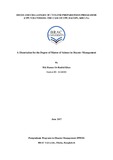| dc.contributor.advisor | Kabir, Dr. Md. Humayun | |
| dc.contributor.author | Khan, Md. Harun-Or-Rashid | |
| dc.date.accessioned | 2018-01-24T05:48:29Z | |
| dc.date.available | 2018-01-24T05:48:29Z | |
| dc.date.copyright | 2017 | |
| dc.date.issued | 2017-06 | |
| dc.identifier.other | ID 16168001 | |
| dc.identifier.uri | http://hdl.handle.net/10361/9158 | |
| dc.description | This dissertation is submitted in partial fulfillment of the requirements for the degree of Master in Disaster Management, 2017. | en_US |
| dc.description | Cataloged from PDF version of Dissertation. | |
| dc.description | Includes bibliographical references (page 41). | |
| dc.description.abstract | CPP is an organization through which Bangladesh get appreciation from the all country of the world. Bangladesh is proud of CPP. Many countries now want to follow the system of CPP. It is so dedicated team they work even they loss their life. So I choice to prepare an assignment about CPP. CPP is a mechanism which relies on technical skills and volunteers commitment for ensuring that all potential victims of an approaching cyclone are given sufficient warning to 11 million coastal people so as to enable them to move to safe- sites including cyclone shelters and buildings. The system starts with the collection of meteorological data from the Bangladesh Meteorological Department (BMD), which issues bulletins including the designated warning signals of an approaching cyclone. The bulletins are transmitted to the 6 zonal offices and the 30 upazila level offices (sub-district) over HF radio. The upazila office in turn, pass it to unions and lower level through VHF radios. The union team leaders then conduct the unit team leaders immediately. The unit team leaders with his volunteers spread out in the villages and disseminate cyclone warning signals almost door to door using megaphones, hand sirens and public address system. This study was undertaken with the aim to understand the current level of knowledge, capacity and functionality of Union Disaster Management Committees (UDMC) and CPP. The evaluation was done to provide insights in how to make UDMCs and CPP fully operational and proactive to work together as in Standing Orders on Disaster. Based on identified functionality gaps the study concludes that the capacity of UDMCs and CPP could be improved through capacity building and updating DM plans and contingency plans, practical support for organizing volunteers, investment in structural risk reduction measures in the most vulnerable areas and strengthened monitoring mechanisms. | en_US |
| dc.description.statementofresponsibility | Md. Harun-Or-Rashid Khan | |
| dc.format.extent | 41 pages | |
| dc.language.iso | en | en_US |
| dc.publisher | BARC University | en_US |
| dc.rights | BRAC University dissertation are protected by copyright. They may be viewed from this source for any purpose, but reproduction or distribution in any format is prohibited without written permission. | |
| dc.subject | Cyclone Preparedness Programme | en_US |
| dc.subject | Bangladesh Meteorological Department | en_US |
| dc.subject | Union Disaster Management Committees | en_US |
| dc.subject | Cyclone | en_US |
| dc.title | Issues and challenges of Cyclone Preparedness Programme (CPP) volunteers: the case of CPP, Dacope, Khulna | en_US |
| dc.type | Dissertation | en_US |
| dc.contributor.department | Department of Architecture, BRAC University | |
| dc.description.degree | M. Disaster Management | |

